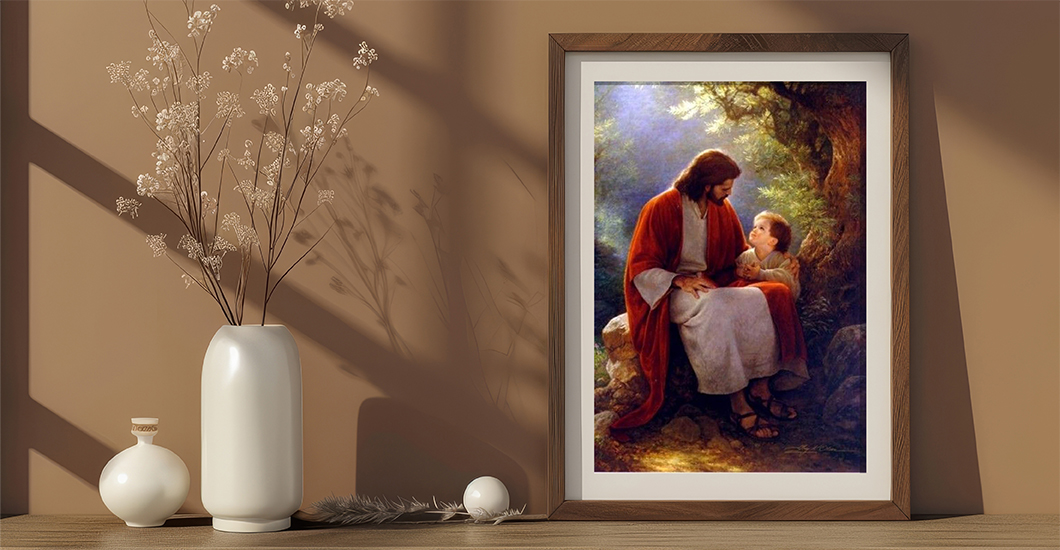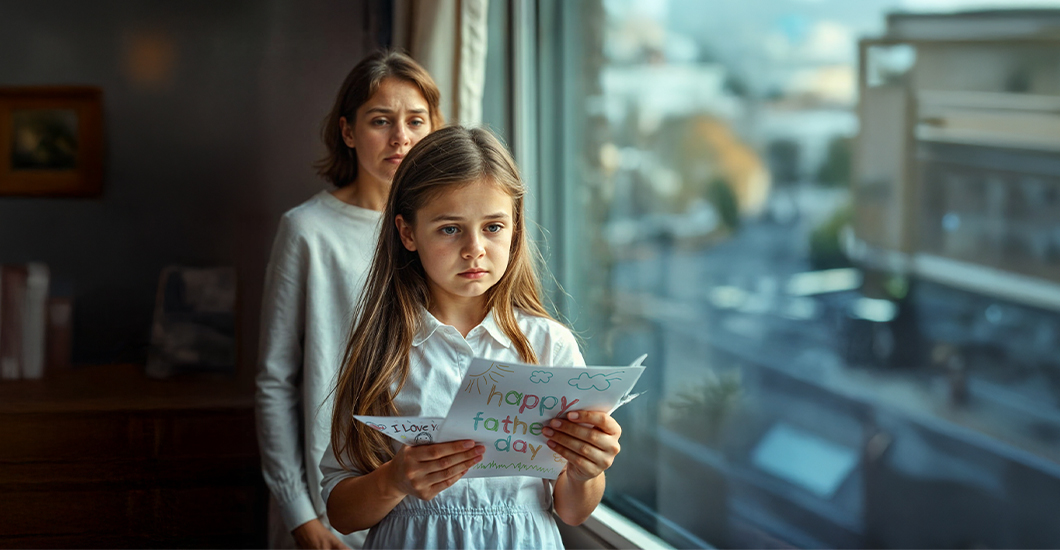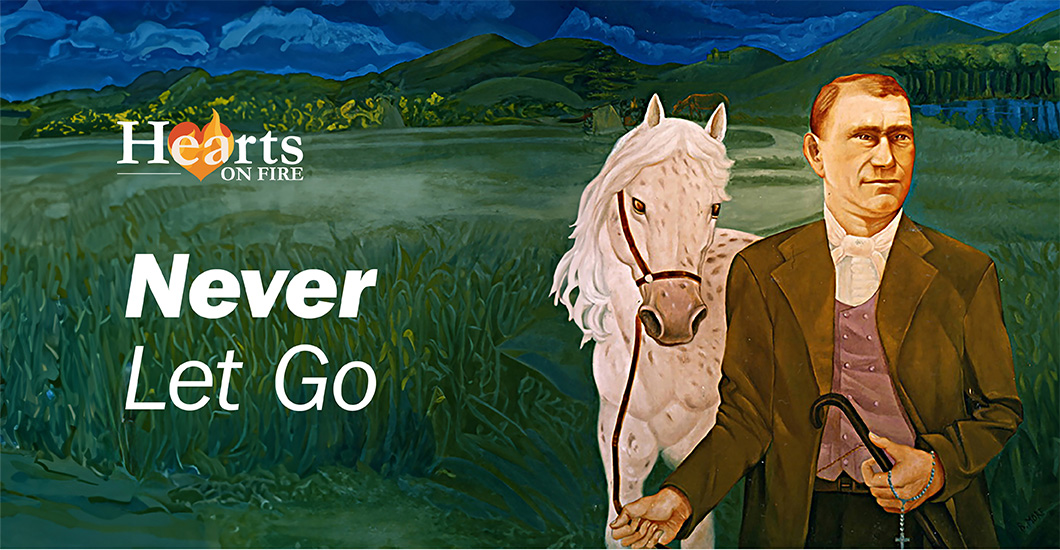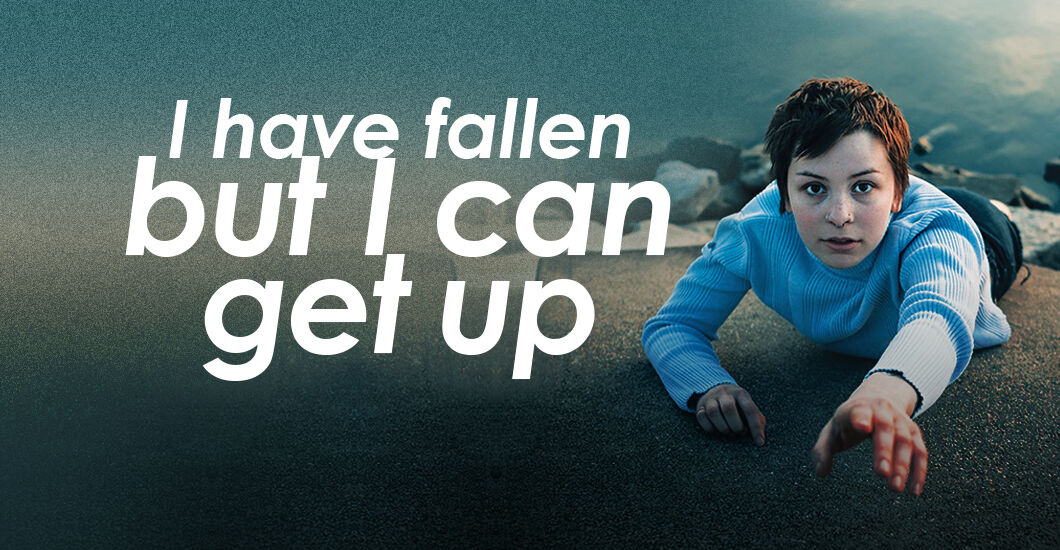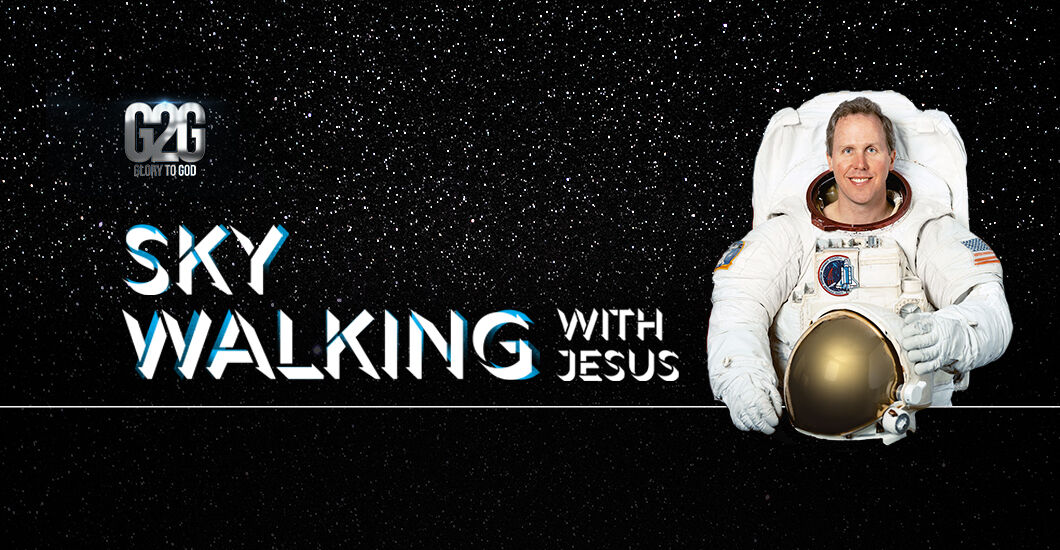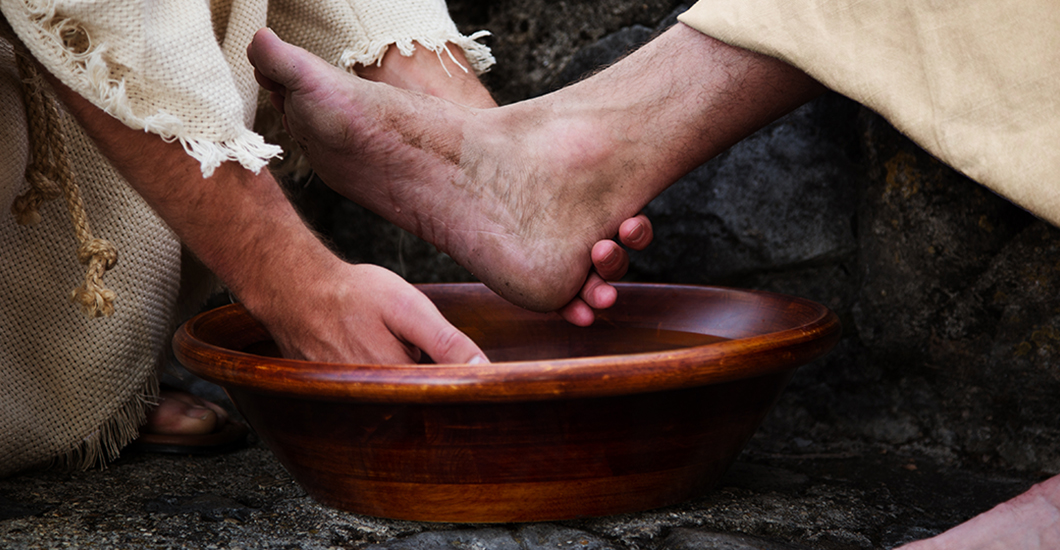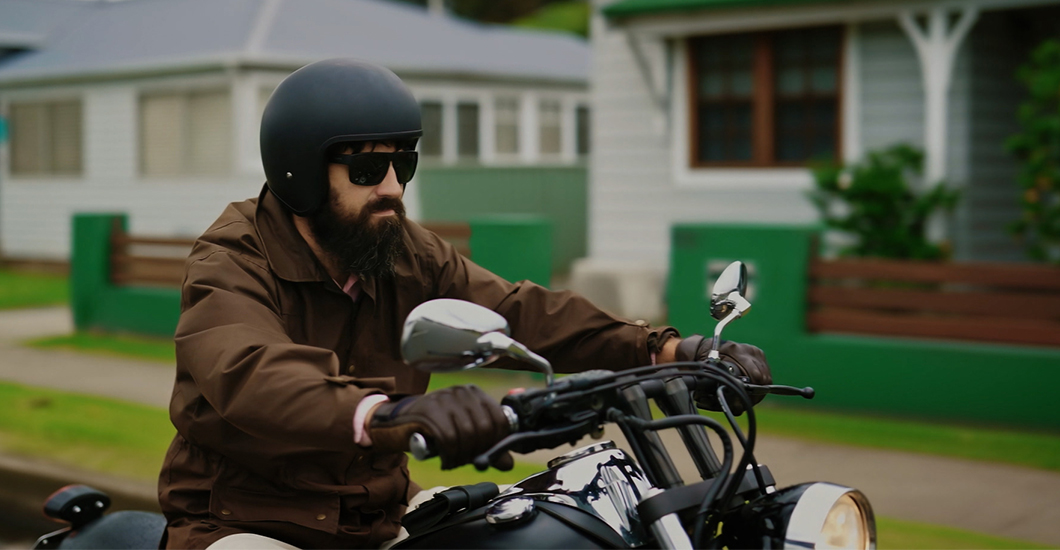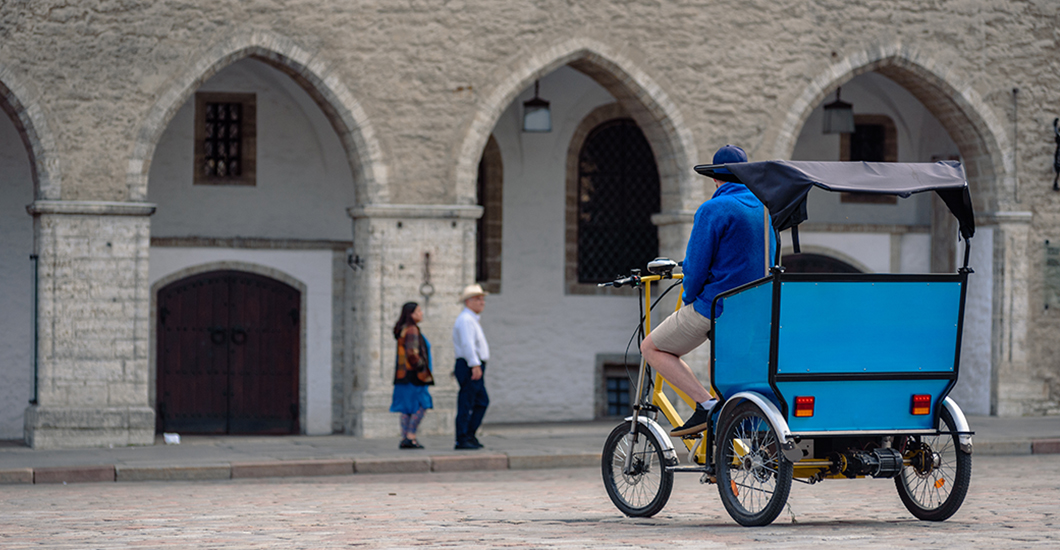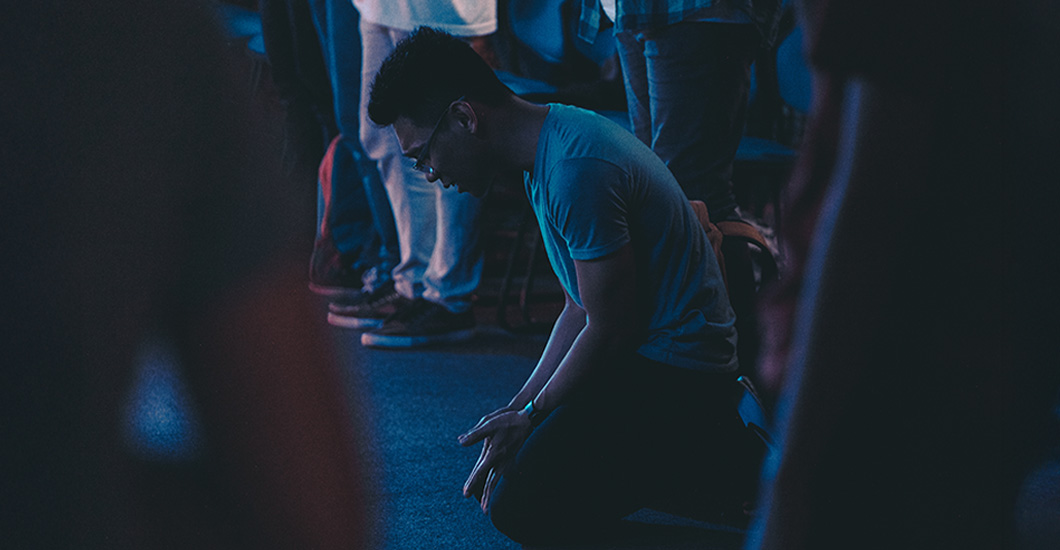Trending Articles
Seeing Old Things with New Eyes
A familiar picture, a routine job, but that day, something different caught her eye.
On the corner of my bathroom vanity is an old photocopy of a drawing (original source long forgotten) in a clear, plastic frame. Years ago, one of my now adult sons had carefully framed it and set it on his dresser. It sat there until he grew up. When I re-homed, I transferred it to the corner of my bathroom vanity. On Saturdays, when I clean the bathrooms, I always lift the little frame and wipe the surfaces beneath it. Occasionally, I’ll swipe my cloth over the smooth sides of the frame to wash away any settled dust and invisible germs. But, like so many other familiar things, I rarely take notice of the image inside the old childish frame.
One particular day, though, this picture caught me by surprise. I eagerly focused on the eyes of the two figures in the image—a child and Jesus. The expression on the little child’s face was one of loving adoration. The innocence of child-like wonder and unrestrained admiration resonated in his soft, penciled eyes. The child’s tender, upward gaze seemed not to notice the horror of the crown of thorns atop Christ’s head or the Cross crushing His right shoulder. In contrast, Jesus’s eyes peered down from beneath heavy lids and shadowed creases. The artist had managed to skilfully veil the depth of pain behind those eyes.
Drawing Parallels
I recalled a memory from my early years as a mother. I was big with baby number three. In the last days of pregnancy, I was attempting to soothe my aching body with a warm bath. I bounded my two young sons. They were full of energy and chatter as they moved around the tub and peppered me with questions. My privacy and physical discomfort were of no consequence to their boyish minds.
I remembered the tears that rolled down my face as I tried, in vain, to get my sons to understand that I was hurting and in need of some space. But, they were simply little children who saw me as their ever-present mama, the one who kissed away boo-boos and always stood at the ready to hear their stories and meet their needs. They lacked understanding of the physical sacrifices that child-bearing demands. And I was too familiar to be seen by them as someone other than their strong, steadfast mother.
I considered the parallels. Like my little boys, the pictured child saw Our Lord through his individual, human lens of experiences. He saw a loving Teacher, a faithful Friend, and a steadfast Guide. Christ obscured the intensity of His Passion—out of mercy and met the child’s gaze with tenderness and compassion. The Lord knew that the child was not ready to see the full measure of the suffering that his salvation had cost.
Lost in the Darkness
Our familiarity with things, people, and situations can make us blind to reality. We most often see through the clouded tunnel of old experiences and expectations. With so many stimuli competing for our attention, it is reasonable that we filter out the world around us. But, like the child in the picture and my own little ones, we tend to see what we want to see and ignore that which does not correspond with our perspectives.
I believe that Jesus wants to heal our blindness. Like the blind man in the Bible who, on being touched by Jesus, said: “I see men, but they look like trees, walking” (Mark 8:22-26), most of us are not ready to see the ordinary with divine eyes immediately. Our eyes are still too accustomed to the darkness of sin, too attached to our self-reliance, too complacent in our worship, and too proud of our human endeavors.
The Full Picture
The price paid for our salvation on Calvary was not an easy price. It was sacrificial. Yet, like the child in the picture on my bathroom vanity, we focus only on Jesus’s tenderness and mercy. And because He is merciful, Jesus doesn’t rush; He allows us to come to a gradual maturity of faith.
However, it is good to ask ourselves every once in a while if we sincerely render efforts towards spiritual maturity. Christ did not give His life so that we might remain in the fantasy world of continued blessings. He gave His life so that we might have eternal life, and we need to open our eyes to see that He bought it at the price of His blood.
As we journey through Lent and especially Holy Week, we need to allow Christ to open our eyes little by little, surrender ourselves to His will, allow Him to remove our idols one by one, and strip away that which has become familiar in our lives so that we may begin to see the old blessings of worship, family, and holiness with new eyes of deep, abiding faith.
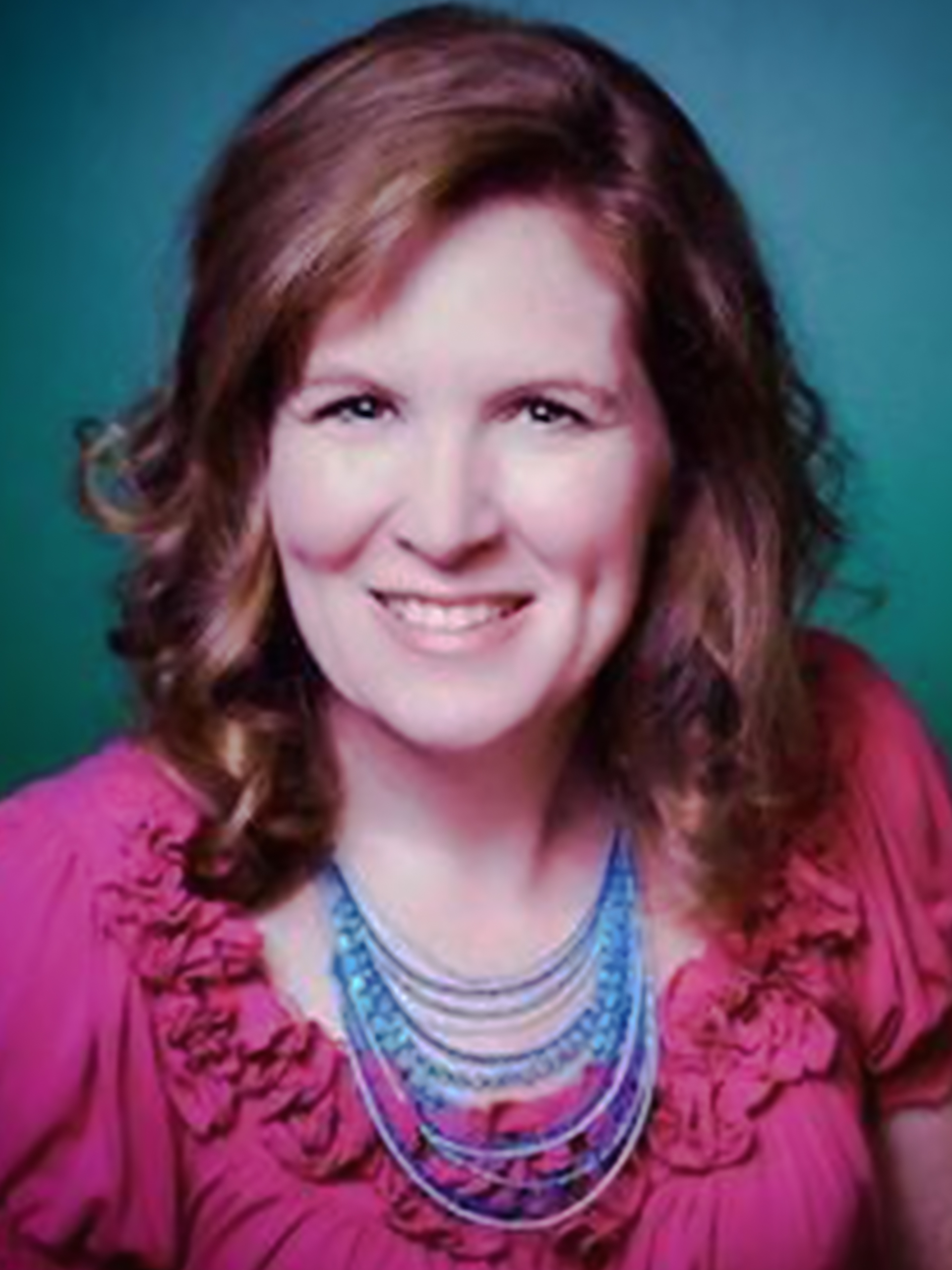
Tara K. E. Brelinsky is a freelance writer and speaker. She lives with her husband and 8 children in North Carolina. You can read more of her musings and inspirations on Blessings In Brelinskyville blessingsinbrelinskyville.com/ or listen to her podcast The Homeschool Educator.
Related Articles
When she lost her mobility, eyesight, listening, voice, and even the sense of touch, what prompted this young girl to describe her life as ‘sweet?’ Little Benedetta, at age seven, wrote in her diary: “The universe is enchanting! It is great to be alive.” This intelligent and happy lass, unfortunately, contracted polio in her childhood, which left her body crippled, but nothing could cripple her spirit! Hard Times on Roll Benedetta Bianchi Porro was born in Forlì, Italy, in 1936. As a teenager, she began to go deaf, but despite this, she entered medical school, where she excelled, taking oral exams by reading the lips of her professors. She had an ardent desire to become a missionary doctor, but after five years of medical training and just one year short of completing her degree, she was forced to end her studies due to increasing illness. Benedetta diagnosed herself with neurofibromatosis. There are several iterations of this cruel disease, and in Benedetta’s case, it attacked the nerve centers of her body, forming tumors on them and gradually causing total deafness, blindness, and later, paralysis. As Benedetta’s world shrank, she demonstrated extraordinary courage and holiness and was visited by many who sought her counsel and intercession. She was able to communicate when her mother would sign the Italian alphabet into her left palm, one of the few areas of her body that remained functional. Her mother would sign letters, messages, and Scripture painstakingly into Benedetta’s palm, and Benedetta would reply verbally despite her voice having been weakened to a whisper. “They’d come and go in groups of ten and fifteen,” said Maria Grazia, one of Benedetta’s closest confidantes. “With her mother as interpreter, she was able to communicate with each one. It seemed as though she could read our innermost souls with extreme clarity, even though she couldn’t hear or see us. I will always remember her with her hand extended ready to receive the Word of God and her brothers and sisters.” (Beyond Silence, Life Diary Letters of Benedetta Bianchi Porro) It’s not that Benedetta never experienced agony or even anger at this disease that was robbing her of the ability to become a medical doctor, but in accepting it, she became a doctor of another sort, a kind of surgeon to the soul. She was, indeed, a spiritual doctor. In the end, Benedetta was no less a healer than she ever desired to be. Her life had shrunken all the way down to the palm of her hand, it was no bigger than a Communion host—and yet, just like a Blessed Communion Host, it had become more powerful than she would have ever imagined. It is impossible to miss the correlation between Benedetta’s life and Jesus in the Blessed Sacrament who is hidden and small too, silent and even weak, but an ever-present friend to us. Towards the end of her life, she wrote to a young man who suffered similarly: “Because I'm deaf and blind, things have become complicated for me … Nevertheless, in my Calvary, I do not lack hope. I know that at the end of the road, Jesus is waiting for me. First in my armchair, and now in my bed where I now stay, I have found wisdom greater than that of men—I have discovered that God exists, that He is love, faithfulness, joy, certitude, to the end of the ages … My days are not easy. They are hard. But sweet because Jesus is with me, with my sufferings, and He gives me His sweetness in my loneliness and light in the darkness. He smiles at me and accepts my collaboration.” (Venerable Benedetta Biancho Porro, by Dom Antoine Marie, OSB) A Compelling Reminder Benedetta passed away on January 23, 1964. She was 27 years old. She was venerated on December 23, 1993, by Pope John Paul II and beatified on September 14, 2019, by Pope Francis. One of the great gifts that the Saints bring to the Church is that they give us a clear picture of what virtue looks like, even in incredibly difficult circumstances. We need to ‘see ourselves’ in the lives of the Saints in order to be strengthened for our own. Blessed Benedetta is truly a model of sanctity for our times. She is a compelling reminder that even a life filled with serious limitations can be a powerful catalyst for hope and conversion in the world and that the Lord knows and fulfills the deepest desire of every heart, often in surprising ways. A Prayer to Blessed Benedetta Blessed Benedetta, your world became as small as a communion wafer. You were immobilized, deaf, and blind, and yet you were a powerful witness to the love of God and the Blessed Mother. Jesus in the Blessed Sacrament is hidden and small too, silent, immobilized, and even weak—and still all-powerful, ever present to us. Please pray for me, Benedetta, that I will collaborate, as you did, with Jesus, in whatever way He wishes to use me. May I be granted the grace to allow the Almighty Father to speak through my littleness and loneliness, too, for the glory of God and the salvation of souls. Amen.
By: Liz Kelly Stanchina
MoreI was three when my life turned upside down. Nothing was ever the same again, until I met Him! At three years of age, I had a heavy fever followed by a sudden seizure, after which I started showing signs of facial palsy. By the time I was five, my face became visibly asymmetric. Life ceased to be smooth. As my parents kept reaching out to new hospitals, the pain and mental damage I went through became too much to bear—the repeated questions, the weird looks, the effects and aftereffects of new medications every once in a while… Crawling into a Cocoon I was comfortable alone because, ironically, groups made me feel lonely. I was so scared that the kids next door might cry out loud if I smiled at them. I remember the sweets my dad brought home every night to help me drink the unpleasant medicine, which was overloaded with bitterness. The weekly walks with my mother along the hospital corridors for the physiotherapy sessions were never a weekend trip—every time the vibrations from the stimulator hit my face, tears would start to roll down. There were some beautiful souls who soothed my fears and pain, like my parents, who never gave up on me. They took me to every hospital they possibly could, and we tried a variety of treatments. Later, I would also see them devastated when neurosurgery was suggested. For the first time in my life, I felt that I was being lived out somewhere else. I had to do something. So, in the first semester of college, unable to bear it any longer, I decided to discontinue the medicines. Discovering Beauty After I stopped the meds, I had an adrenaline rush to create something on my own. I welcomed a new life, but I was totally clueless about how I should live it. I started writing more, dreaming more, painting more, and searching for colors in all the grey areas of life. Those were the days I started actively participating in the Jesus Youth Movement (an international Catholic movement approved by the Holy See); I started to slowly learn how to open myself to God’s love and feel loved again… The realization of the importance of the Catholic lifestyle helped me understand my purpose. I started to believe again that I am so much more than everything that has happened to me. Now, when I look back at those moments marked by the closed doors, I can clearly see that within each rejection, the ever-compassionate presence of Jesus accompanied me, enveloping me with His boundless love and understanding. I recognize who I’ve become and the wounds I’ve healed from. Reason to Hold on Our Lord says: “Since you are precious and honored in my sight, and because I love you, I will give people in exchange for you, nations in exchange for your life. Do not be afraid, for I am with you.” (Isaiah 43:4-5) Finding Him in my insecurities was never an easy task. While having plenty of reasons to move farther, it was all about finding that one reason to stay. And it gave me strength and confidence to live through my vulnerabilities. The journey of finding my worth, dignity, and joy in Christ was simply wonderful. We often complain about not finding grace even after the struggles we go through. I think it’s all about seeing through the struggles. Expressing honesty in the slightest adjustment in life without any sort of wrath brings light to your life. It was quite a journey. And while He is still writing my story, I’m learning each day to embrace more, reach out without inhibitions, and make room for little joys in life. My prayers no longer hold the constant need for things I desire. Instead, I’m asking Him to strengthen me to say ‘Amen’ to the changes that keep happening along the way. I’m praying that He heals and transforms me from all the negative influences within and around me. I’m asking Him to revive the parts of me that were lost. I’m thanking Him for everything I’ve been through, all the blessings I receive every minute of the day, and for the person I’ve become. And I’m trying my best to love Him with all my heart and soul.
By: Emilin Mathew
MoreIt was July 1936, the height of the Spanish war. El Pelé was walking through the streets of Barbastro, Spain, when a huge commotion captured his attention. As he rushed to the source, he saw soldiers dragging a priest through the streets. He couldn’t just stand on the fringes and watch; he rushed to defend the priest. The soldiers weren’t intimidated and shouted at him to surrender his weapon. He held up his rosary and told them: “I have only this.” Ceferino Giménez Malla, fondly known as El Pelé, was a Romani—a community often pejoratively referred to as Gypsies and looked down upon by mainstream society. But Pelé was held in great esteem not only by his own community, even educated people respected this illiterate man for his honesty and wisdom. When he was arrested and imprisoned in 1936, his wife had passed away, and he was already a grandfather. Even in prison, he continued to hold fast to his rosary. Everyone, even his daughter, begged him to give it up. His friends advised him that if he stopped praying, his life might be saved. But for El Pelé, to give up his rosary or to stop praying was symbolic of denying his faith. So, at the age of 74, he was shot dead and thrown in a mass grave. This brave soldier of Christ died shouting: "Long live Christ the King!" still holding a rosary in his hands. Sixty years later, Blessed Ceferino Giménez Malla became the first of the Romani community ever to be beatified, proving again that the Savior is ever-present to everyone who calls upon Him, irrespective of color or creed.
By: Shalom Tidings
MoreTo be good at anything, we have to put time, effort, and practice into it. The same applies to our preparation for eternity. How well are we going to do at the end of year exams if we have put little or no time towards studying during the year? Similarly, how well will we stand up on judgment day when we are held accountable for our lives? In our preparation period on earth for eternity, how much of our life was spent in prayer, good works, and sacrifice? Our Lord paid the ultimate price for our salvation, but we have to play our part. As He has graciously allowed us to be part of that sacrifice, let us not waste this valuable opportunity. He, through Calvary, has given us a chance to be part of His redemption, to be part of His sanctity, consequently allowing mere humans to be called into sainthood. What a privilege! As my mother would always remind us, children, this life of ours on earth, short or long, is but a preparation period, the springboard to eternity. How we fare in the structure of eternal life will be determined not only by Jesus’ death and resurrection, but by every thought, word, and deed we perpetrated during the time we spent on earth.
By: Sean Hampsey
MoreGod answers prayers and sometimes He goes so far beyond anything we ever believed could happen... There’s a popular television commercial that aired for many years portraying an injured person desperately calling out, “Help, I’ve fallen and I can’t get up!” Although they’re just actors selling a medical alert system that summons help in case of an emergency, each time I’ve seen that commercial I’ve wondered what it would be like to be in such a desperate vulnerable position. Being alone and incapable of getting back up after falling must feel stressful and frightening. Fortunately there are companies and gadgets we can rely on to put safety measures in place for us or our endangered loved ones. Recurring Dilemma That commercial came to mind one day when I was examining my conscience in preparation to receive the Sacrament of Penance (also known as Reconciliation or Confession). After reflecting on the things that were offensive to God that took me further from His presence, it was frustrating to fall off the path to holiness again and again. It occurred that there were things that I needed to confess that I’d previously confessed often. Saint Paul talks about his struggles with the same dilemma. In the book of Romans (7:15-19) he said, “I cannot understand my own behavior. I fail to carry out the things I want to do, and find myself doing the very things I hate...instead of doing the good things I want to do, I carry out the sinful things I do not want.” This is a struggle we all experience. The Catechism of the Catholic Church defines this unwanted inclination to sin as “concupiscence”. It was easy to relate to the actor in the commercial because spiritually I’d fallen, and it felt like I couldn’t get back up. Drawing away from God placed me in a desperate, vulnerable position deprived of many of the graces He offers us. My relationship with God was damaged, and the thought of staying in that fallen state was stressful and frightening. However, Jesus loves me. He’s merciful and has put safety measures in place for all of us who still suffer with the unwanted inclination to sin. Unceasing Prayer The church my family attended offered the Sacrament of Penance an hour before the Saturday evening Vigil Mass. It was important for me to go to Confession on Saturday because I valued my relationship with God and wanted to restore it. I asked my husband if he would join me when confessions finished, so that we could attend Mass together. To my delight, he agreed. He was raised Methodist and for over 25 years it had been my unceasing prayer that God would place the desire on his heart to come into the fullness of his faith, by becoming a member of the Catholic Church. For now, I was waiting on God’s timing and was just happy that we’d be together. The church wasn’t crowded, so before long I was kneeling before the priest to confess my sins. Confessing sin requires humility, but the joy of absolution left me feeling new and restored. After completing the penance from the priest, my heart no longer felt heavily weighed down by sin. Everything around me and in me was quiet, as a sense of peace encompassed my spirit once again. Repeatedly, I thanked God for His mercy. At one point, I sighed with contentment, “Lord, I don’t want to spoil this moment by asking you for anything. I just want to thank You over and over again. I want to be like the one leper who came back to thank You after You healed him.” I knelt there engulfed in His holy presence and understood what being in a state of grace really felt like. Jesus had restored our relationship and we were one again. However, being still and quiet is a virtue that is a regular struggle for me. It wasn’t long before a strong impulse to ask God for just one thing popped into my head. “Lord, just one thing and it isn’t for myself. Please give my husband the desire to become Catholic. I want him to know what this feels like.” Time in quiet prayer passed quickly and it wasn’t long before my husband sat beside me. I’ve heard it said that when you pray in the state of grace, your prayers are clearly heard by God. You’re so close to Him that He can hear the whispers of your heart. I’m not sure if that’s solid Catholic doctrine, but it makes a point of how important it is to remain close to God. When Mass began that evening, the priest welcomed everyone and he asked us to take a quiet moment to offer our Mass up for any personal intentions we might have that evening. His prompting was wonderful but not the way he usually opened the Mass. Not wanting to waste the moment, I immediately repeated the prayer for my husband to come into the Catholic faith. I’d never heard that priest begin the Mass like that before or since that evening. In hindsight, it was a good indication that God’s answer to my prayer was imminent. The intention remained in my heart for the rest of Mass, and I felt very connected to both God and my husband. Startling News On our way home, my husband unexpectedly said he had something to tell me. It was a very good thing that he was driving, because the following words might have startled me into swerving off the road. “I have decided that I want to enroll in the RCIA (Rite of Christian Initiation of Adults) program at our church and see if I want to become a Catholic.” Stunned, I said nothing. Thoughts and emotions swirled through my mind and body. I recall asking God: “What was happening here? Had the Sacrament of Reconciliation cleared up the connection for you to hear my prayer? Had my personal Mass intention been heard? Were You really answering my prayers after all these years?” After regaining my composure, my husband and I talked about his decision. We had been attending Mass together for our entire marriage and it was important to him that our family went to one church. Through the years, he had had many questions, but had grown to love and trust the Catholic Church as his family. The Holy Spirit guided him to understand that was the right time to fully commit to becoming a part of that family and be able to partake in all the sacraments and their graces. The following Easter Vigil, after he’d completed the RCIA program, my husband was finally confirmed as a member of the Catholic Church, filling us both with great joy. My heart continues to dance with joy, unceasingly thanking God for this long-awaited answer to my prayer. More Surprises in Store! But wait, there’s more! God knew I’d asked Him if he’d really heard and answered my prayers. He wanted to make sure I knew for certainty that He had, because more surprises were in store. Two of our sons were in solid relationships. Both were wonderful young women who had grown up walking with the Lord in their Protestant faith. They too had been regularly included in my prayers for conversion to the Catholic faith, although I had not specifically prayed for them that evening. Within a week of that special Mass, independent of each other, both young women shared with me that they intended to become Catholics. I know with certainty that my husband's decision to become a Catholic was not a mere coincidence and as an added bonus: those wonderful young women are now my daughters- in-law. Praise God! I don’t pretend to know the mind of God, nor how the 3 of them, independent of each other, decided to become Catholics. It’s a miracle to me and I am happy to leave it at that. Okay, not exactly...one more thing. I believe that when we do something that hurts our relationship with God, we need to go to Him in Confession and say we are sorry. I believe that when we truly want to get our relationship right with God, He wants to bless us. I believe that prayer really does work and He wants to answer us. I believe that God loves me and blessed me not once, not twice, but three times that Saturday, but He wanted me to also know that He hears ALL my prayers at ALL times no matter what state I am in. I knew that I had fallen and, because of concupiscence, I am likely to fall again. Alleluia, there is good news! Even when I cannot understand my own behavior; even when I fail to carry out the things I want to do, and find myself doing the very things I hate...even when I don’t do the good things I want to do, and carry out the sinful things I do not want; with God’s grace and through His forgiveness, I know I am not alone, I don’t have to be stressed, frightened or stay fallen. I CAN get back up. Saint Paul, pray for us. Amen.
By: Teresa Ann Weider
MoreA special interview with Dr. Thomas D. Jones who went on four separate shuttle missions with NASA. On one of those missions, he was actually able to take the Eucharist with him! Tell us about what it was like to be out in space looking out at the stars and back at the Earth. How did that impact your faith in Jesus? To realize my professional dream of flying in space, which every astronaut hopes for, I had to wait for almost 30 years. So my first flight was the realization of a childhood dream. Gazing out at this immense view of the cosmos surrounding our home planet, gave me a chance to think about why I was there. It was such an emotional experience to truly see the incredible beauty of the universe, and our home planet in all its lovely variety— really breathtaking. I just felt so thankful to God for the chance to be there physically—overwhelmed by His grace and Presence. You are known as one of the astronauts who was able to bring the Eucharist into space. For all of us who are believers, that is just so inspiring. Could you share that whole experience? It was certainly amazing to all of us who participated. One can't go anywhere as remote as space and forget about your spiritual life. It is faith that helped me succeed on Earth and this is the same faith that I was counting on to help me succeed in space. On my first flight in 1994, aboard the shuttle, Endeavour, there were two other Catholic astronauts. When we got together to prepare for the 11 day mission, we talked about how wonderful it would be to take the Eucharist with us into space. So, because Kevin Chilton, our pilot on the flight, was an extraordinary minister of Holy Communion, we were able to receive permission from our pastor to bring the Blessed Sacrament with us. Every moment of the eleven-day-flight was tightly scheduled, but our Catholic commander, Sid Gutierrez, was able to find a spot about seven days in, when we were comfortable with how the mission was going, for a ten-minute Communion service. So, on that Sunday—our second Sunday in space— we took a pause from all the business of the mission to spend ten minutes alone in the cockpit with the God who had made this all possible, and share Holy Communion with Him. Indeed, it was a recognition that we could never have reached that point without His presence among us. It was really satisfying to bring our faith-life into space and to know that He was there, physically, with us. Have you ever found it difficult to bring Science and Faith together? Could you elaborate on the relationship between science and faith? Throughout my professional career, I have known many scientists who are spiritual, and they have their own faith practices. Right here in northern Virginia, I have met several Catholic scientists and engineers in my own church who share a strong faith. They believe in God’s Creation, and in the biblical inspiration of how we understand the universe. I think most people have some spiritual elements in their lives. I have known astronauts who are not formally religious, but they were all moved by the spiritual experience of space travel. So I have found that most people are open to what the universe and the natural world around us reveal in terms of how we understand Creation. Scientists are so curious, like all humans, about the nature of the universe and what we can learn about it. To me, this is a sign that science and spirituality go hand in hand. Our curiosity and interest in nature and how it functions, how the universe is put together and how it was created—that curiosity was given to us because we're made in the likeness of God. That's part of His personality imparted to us. So I think that this search for the truth about the natural world is a part of our innate nature as human beings. I believe that the quest for knowledge is something that gives God a lot of pleasure—to see the creatures that He has made seeking out the secrets of how He has put the universe together. Mind you, He's not trying to keep it a secret. He just wants it to be unveiled through our own efforts, ingenuity and curiosity. So, to me, there's not a lot of conflict between Science and Nature and Spirituality. I think that people trying to separate them are attempting to split human nature into a rational half and a spiritual half. Of course, that can’t be done. A person is one human being whose nature can't be separated. On your space missions you were accomplishing, in many ways, the epitome of human achievement. Doing something really great, and yet encountering something so much greater in magnitude—the glory and the majesty of God's creation… What was it like to have accomplished so much, while still recognizing your own smallness compared to God? To me it all crystallized on my last mission. I was helping build the space station, doing three space walks to install a science lab called Destiny. Near the end of my last spacewalk, I was out on the very front end of the space station. Since I was ahead of our work schedule, NASA’s Mission Control let me hang out for about five minutes out there. By holding on to the front of the space station with my fingertips, I was able to rotate around so I could see the immensity of space surrounding me. I looked down at the Earth, 220 miles straight down past my boots to the deep blue of the Pacific Ocean. I was floating there looking out to the horizon—a thousand miles away--and then the endless, black sky up above my head. About 100 feet above me, the space station glowed like gold with sunlight reflected from its solar panels, as we silently fell around the world together. This amazing view was so incredibly beautiful that it brought tears to my eyes. I was overwhelmed by this feeling, ‘Here I am, a highly trained astronaut on this space station, cruising around the Earth, yet I’m just a puny human being compared to this vast cosmos out there.’ God pulled the curtain back a little bit for me, letting me see that magnificent vastness in a personal way. I felt, “Yes, you're very special because you're getting to see this view”, but was reminded of how insignificant we all are in the vast universe which God has created. Feeling important and being humbled at the same time was a gift from God. It literally brought tears to my eyes as I thanked the Lord, thrilled to be sharing this view with Him. Very few humans ever have the experience and privilege of seeing Earth from that perspective, and it was all thanks to Him. There’s a lot of confusion in the world right now…a lot of darkness and suffering; but when you look at the world either from that very unique vantage point that you had in Space, or now in your current state of life, what's giving you hope? I think what inspires me is that we've been given very curious minds by God. We've got this innate curiosity and that's made us problem solvers and explorers. So, even with all the challenges we are beset by today, whether it's a pandemic, or the threat of war, or feeding seven billion people around the world, we've got the skills that we've been given and we're called to put them to good use in order to solve these problems. There is a vast universe out there, full of resources. It challenges us, but if we look beyond our home world into the solar system and the universe, there are a lot of things that we can make use of. Vast material resources on the Moon and nearby asteroids can supplement those we find on Earth. There's a colossal supply of solar energy which could be harvested from space and beamed down to the world to help supply everybody with the power and electricity that they need to succeed. We've got the ability to ward off rogue asteroids that have often struck Earth, and because we've got space skills and the minds to develop a way to defend our planet, we can prevent these most terrible of natural disasters. So, we don't have to go the way of the dinosaurs if we use the skills that we've acquired and put ourselves to the task. We live in a world that encourages us to use our curiosity and intelligence to solve these problems. So I’m very optimistic that by applying our skills and the technology we develop, we can stay ahead of all these challenges. Look at the vaccine that we developed just this year to fight the virus. That's a mark of what we can do when we put our minds to something, whether it's putting a man on the Moon or sending the first woman to Mars. I think we're in good shape for the future as well. ---- ARTICLE is based on the special interview given by Dr. Thomas D.Jones for the Shalom World program “Glory to God.” To watch the episode visit: shalomworld.org/episode/an-astronauts-faith-drthomas-d-jones
By: Dr. Thomas D Jones
MoreLatest Articles
This is the best paradigm of master-slave dynamics the world has ever seen… In the early ‘60s, an emerging blue-rock band, The Rolling Stones, let loose a misogynistic song, Under My Thumb, that illustrates a certain social dynamic. We hear: Under my thumb The girl who once had me down Under my thumb The girl who once pushed me around … It’s down to me, yes it is The way she does just what she’s told, Down to me, the change has come She’s under my thumb, Ah, ah, say it’s alright. As offensive as these lyrics are, they contain a paradigm of the dominant consciousness of a society of how people relate to each other in the political, economic, and social domains. 19th-century German philosopher Friedrich Hegel explained this dynamic with his notion of the master-slave dialectic, which said that one’s sense of self-worth is directed towards someone who is perceived as unequal to oneself. Like The Rolling Stones, Hegel is talking about very dark social relationships in which the ego seeks to be in control, to dominate others to obtain one’s needs and to obtain privilege and status. So, the world is divided into insiders and outsiders— those at the top and those at the bottom. Or, as Bruce Springsteen once sang: “Down here, it’s just winners and losers, and Don’t get caught on the wrong side of that line” (Atlantic City from Nebraska). For those who are on the winning side, they want to keep things the way they are because the status quo works to their advantage. So, the master-slave dialectic seems to work at all levels. Along God’s Way Now, even before Hegel et al., the authors of the Old Testament were concerned about this problem because their central story was the Exodus Experience, which was a movement from oppression to liberation in which God identifies with the oppressed and resists the oppressor. God, working through Moses, brings the people out of servitude and guides them to the Promised Land—a state of justice and human flourishing. In doing so, God overcomes the master-slave dialectic, which is the central work of the God of Israel. Now, fast-forward 1200 years to Yeshua, Jesus of Nazareth, around 33 A.D., who appears in the hills of Galilee. On the lips of this young man who spoke as one having authority was the message that the Kingdom of God was at hand. That is, God’s way of ordering things is coming about, and this Kingdom is perfectly personified in Jesus. What God has in mind in how we organize ourselves radically differs from the master-slave dialectic. What does Jesus have in mind when he proclaims and lives in the Kingdom of God? The best source is the Sermon of the Mount in Matthew’s Gospel, chapters 5-7. In the Kingdom, we wouldn’t be hungry and thirsty for domination, but we would hunger and thirst for righteousness. Rather than clawing for the highest position, we should embrace mercy, tenderness, and compassion. Not stuck in the dreadful lex talionis: “An eye for an eye, a tooth for a tooth” ethic, but if someone slaps you on the right cheek, show him the other. If someone takes your outer garment, give him your shirt as well. And love not just your neighbor but your enemy as well. With that background in mind, Jesus will put into action His teachings in a very strange episode during the Passover Meal by washing the feet of his disciples (cf. John 13:1-20). Jesus will radically overturn the master-slave dynamic by becoming the slave, the servant. At the Last Supper, He takes off His outer garment and puts a towel around His waist in the posture of a slave. Then He proceeds to do something that is so low that only the lowest slave would be expected to do. He begins to wash their feet. Peter was so shocked that he protested and said to Him, “You will never wash my feet.” Jesus answered, “Unless I wash you, you have no share with Me.”(John 13:8) How To Be Kingdom People? Just as the Israelites passed through the Red Sea, the Washing of the Feet is a radical new beginning: Peter, do you want to be a member of the Kingdom of God that I proclaim? Do you want to participate in this new way of being? If so, you must pass through the waters of washing the feet of others and see yourself humbly serving them. The movement of the Exodus Experience to the Washing of the Feet leads us to the Eucharist. Knowing how challenging it will be to become Kingdom people, Jesus chose to be always with us. We hear in Paul’s first letter to the Corinthians: “On the night when He was betrayed, took a loaf of bread, and when He had given thanks, He broke it and said, ‘This is My body that is for you. Do this in remembrance of Me.’ In the same way, He took the cup also, after supper, saying, ‘This cup is the new covenant in My blood. Do this, as often as you drink it, in remembrance of Me.’”(1 Corinthians 11:23-25) This is the climax of Jesus’ public ministry, which will express the fullness of the Kingdom of God. What does Jesus do when He sums up what His life and ministry are all about? He gives himself away! “This is My body”—for a first-century Jew, that meant this is me; this is my person. “This is My blood”—everything I am is poured out for you. The Washing of the Feet is where the master becomes the slave. It challenges us to make our lives one of self-giving generosity as a template for all our relationships. Giving away His body and blood is our initiation into the dynamics of the Kingdom of God, which is why the Eucharist is the ‘fount and summit’ of our worship and life. How can we contrive to undermine the dynamics of the master-slave dialectic and give ourselves away?
By: Deacon Jim McFadden
MoreAndrew Byron unfolds the story of the profound experience he had when he called upon the name of Jesus! In December 1996, just two days before Christmas, my life took a devastating turn. My best friend, with whom I had grown up and who was about to become the youngest pilot instructor in Australia, died in a plane crash right in front of his family. I can still remember the feeling when my father informed me about my friend's passing. Although it didn't sink in at first, I remember how I broke down at the funeral. Soon, I became grief-riddled, depressed, and lost all hope. I tried to self-medicate with drugs and alcohol, which only led to greater depression, and I became very suicidal. Finally, I felt that the only way to escape the misery in life was to leave home. The U-turn I decided to leave for Queensland, miles away from my home in Tom Price, hoping that I would get a job, probably picking fruit. So, after school, instead of getting off at my stop, I continued my journey and got off at the highway. While hitchhiking along the Pacific Highway, an older man stopped to give me a ride and urged me to call home and inform my parents about my whereabouts. I called home and reached my father, who asked, "What are you doing? Why are you up there?" I said: "I'm leaving home," and he replied that I was breaking his heart. I was so consumed by drugs that I couldn’t grasp how leaving home impacted my parents. When I got back in the car with him, he persuaded me to visit my aunt's house at Old Bar beach. After dropping me off, he left. Although it was cold, I walked to search for my aunt's house. Suddenly, a car pulled over and offered me a ride. They invited me to stay at their home for the night. I was deeply touched by their gesture and chose to join them. At their home, they had a carton of beer, and we began drinking. They said I could live with them if I would sell drugs for them. I agreed and started partying with more drugs and alcohol. But soon, a realization struck me that I had a loving family. I also realized I had just sunk into a worse situation. When I told them that I was going back home, they said I couldn't leave, and if I did, they would have to kill me. They began torturing me with frying pans and steel-capped boots. They stripped me, tied my hands to my ankles, and blindfolded me with my shirt. I was dragged into a car boot. I could feel that my jaw was dislocated, my nose was broken, and I was in tremendous pain. I'd lost a lot of blood. They pulled over the car, and two men dragged me out of the boot. I was pretending to be dead, trying to stay stiff, but as they pulled me out, my elbow bumped into the boot of the car, and they realized I was still alive. They placed a large kitchen knife against my back and started hitting it with a rock. As the knife went up my spine, I felt this was my death; I was dying. They thought I was dead and threw me down the cliff. I was in extreme pain. Though blindfolded, I managed to climb over a big log but ended up in the water. The water was very cold, and as I put my head in, I realized I shouldn't give up. I could feel my breath getting shorter, my body shutting down, and a great darkness coming over me. I knew that I was going to hell. That was a terrifying moment! I cried out to God. He saved me! At that moment, I was enveloped in a sense of peace—an overwhelming warmth. So, I laid in that creek in the cold water in absolute joy, which I've never experienced since. Whenever life gives me trouble now, I always remember that moment. Before I Passed Out When the sun rose, I began climbing the cliff by grabbing saplings. I fell down several times, but eventually, I reached the top of the road. I asked God what to do, and He said: "Go right." So I walked. I don't know how far it was, but I found a Ranger's Cottage. No one was home, so I grabbed a brick and broke the window. I rang Triple Zero*, took a hot bath, and went to the fridge, where there was one beer. I had no idea where I was. I rang Triple Zero again. Looking out the window, I saw the car that had dropped me off the previous night driving past very slowly as if about to turn into the driveway. At that same moment, a police car and an ambulance came up the driveway, causing the car to speed off. The ambulance crew assessed me and said they couldn't transport me by road and would have to get a helicopter, considering my condition. The Westpac rescue helicopter landed, and the pilot got out and asked: "Do you mind if I pray with you?" He laid his hand on my head, and I passed out. It was February 27, 1998; My entire life changed that day. I woke up in the hospital and soon learned that the knife had gone up my spine and came to rest, touching the sheath of the nerve that controls breathing. A surgeon from Sydney had to fly in to remove the knife surgically. Finding My Way Overcoming the greatest chapter in my life, I moved to Sydney in 1999, where I attended the Youth Mission. While being there, I experienced a profound conversion and truly fell in love with Jesus. I laid everything down for Jesus, and again, I was filled with peace. I now realize that whenever any difficult or traumatic situation or circumstance comes up in my life, I recall the thought I had while lying at the bottom of the cliff—just look up and understand that God already knows; He goes before us and has every situation under control. I have to trust Him, and it's a beautiful thing. Later, I moved to Melbourne, where I connected with the Disciples of Jesus. This Covenant Community has been very good for formation. Through the Ministries, I learned the importance of God's armor. In the community, brothers in Christ can lean on one another, share their experiences, and walk the journey together. When I had my addictions to drugs and alcohol, I couldn't escape their grasp over my life. I tried many things, including cutting off friendships and isolating myself, but nothing seemed to work. The only thing that could free me from the addiction was Jesus—trusting Him and allowing Him to enter my life. I love Jesus very dearly. For anyone suffering from addictions, I would say that Jesus is the way. *Triple Zero (000) is the primary national emergency telephone number in Australia.
By: Andrew Byron
MoreNo trip lasts forever, but how do we convince a child that it is time to let go? I lived in Charlotte, North Carolina, for a while, and out of all the jobs available, I found myself pedicabbing. That's right, I was tasked with bicycling people around the city. Of course, I was in the best shape of my life. I carried numerous people, covering upwards of 100 miles on a weekly basis. I gave rides to celebrities, political figures, conference goers, and the nightlife thrill-seekers. My most memorable fare was an unexpected family just leaving a restaurant. As chance would dictate, I was in the exact vicinity searching for my next customer, and I yelled: "Hey, y'all need a ride?" These two parents were doting on their seven or eight-year-old child. He was celebrating his birthday, and when he saw me, the kid immediately started tugging on his father's arm and pleaded: "Pappa, Momma! Can I please take a ride? Please? Please? Pleeeeeeease?" They both looked at him endearingly and said: "Of course. It's your special day!" Without asking the price, the father asked if I could give them a nice long tour of Uptown Charlotte. Hence, I was tasked with showing them all the spots I could think of that would interest the youngster. We weaved in and out of traffic; I showed them parks, beautifully lit buildings, waterfalls, monuments, and statues…We even stopped to listen to troubadours and watch street artists and magicians. No doubt, this child was having the time of his life. The gentle summer breeze rushed through our hair, and I, too, felt a certain joy knowing I was making this kid's birthday extra special. Hopefully, it would last a lifetime—it certainly has for me. A Life Lesson The trip came to an end, and when it was time to disembark, the kid immediately started to whine and plead: "No! Pappa! I'm having so much fun. I don't want it to end. Please, let's continue!" I definitely hear the hint of a tantrum as I start to see tears well up in this kid's eyes. I simultaneously see the father beginning to worry. After such a wonderful evening and giving his son all he asked for, would he also be forced to play the ‘bad guy?’ I am now convinced the Holy Spirit inspired me to intervene, not because I was trying to give grand advice or bestow memorable life lessons. In fact, my motivation was that I saw an opportunity to be well-tipped for all my efforts. I now see that what was said paved the way for me to learn a much more important lesson—a lesson God is trying to teach us all. Turning around in my seat and smiling, I said to the kid: "Thank you so much for sharing your special day with me! I was privileged to make this day so special for you. I can honestly say I had just as much fun giving the ride as you probably had taking it. But what makes this experience so special is that it can't last forever. If all great things never ended, this experience would no longer be extraordinary; there would be nothing to compare to this exciting activity. But now that it's over, I hope you take this experience and treasure it forever." The father smiled at me and said: "Thank you." He was undoubtedly relieved that his son no longer showed signs of throwing a tantrum. In fact, the kid did something I thought was even more shocking. He grabbed his father's hand, looked up at him, and said: "You're right, Pappa! It's time to go home. Thank you." Twelve years later, I realized that what I said to the kid was nothing compared to the lesson I was to learn from the response he gave his father. The world provides an array of thrills, experiences, and distractions. Some bring joy, while others just give the illusion of such. I had a great life as defined by the masses: I ended up going on to have a promising career, and I traveled the world and continued to enjoy worldly (often sinful) things. In short, I refused to get off the perpetual exciting ride. But even when I was most estranged from the faith, the Holy Spirit was still working, paving the way for when finally God said: "It's time to disembark." I now realize that, like this kid, my response needs to be to grab God's hand and say: " You're right Pappa! It's time to go home."
By: Aleksie Ivanovich
MoreUntold graces and miracles are available to those who practice surrender. I frequently tell my friends about ‘surrender,’ but I receive this question in return: "What does surrendering look like in reality? Am I supposed to ignore the dirty diaper?" The short answer is no! Clean the baby and toss the diaper. Each moment in our lives is a gift from God. Every second is pregnant with possibilities. I can surrender my exhaustion, frustration, joy, or confusion by giving God access. In doing so, I am letting Him determine solutions. I use my freedom to yield to the One with a better plan. How do I know it is better? Because He is the Alpha and the Omega. Although we each have various challenges, the same principles apply. The answer lies in our perspective. Essential to surrender is how we look at any given situation. For instance, I can either go: "Why does the baby always wait until I am ready to leave the house to dirty her diapers?” or instead, be more positive: "That was a close call. I'm happy it happened at home." The latter isn't always my first thought, but I'm making progress. Assuming that various people and situations are specifically intended to frustrate me makes me a target. Pay attention to your perspective. How do you react when something or someone upsets you? Do you feel personally attacked? A positive way to combat that is to flip it around. God has a different plan for me today. Shifting from a target mentality to a recipient of God's grace is all in one’s perspective. Crosses of Our Own Making Being a recipient allows me to receive invitations from God throughout the day. I can freely agree or refuse to be His instrument in any situation. It's letting God's Will be accomplished through my yes. In this, I imitate the Master and grow in virtue. Can you begin to see how surrender works? How much of the anxiety and fear that we experience is self-imposed? I once read that many of the crosses we carry are of our own making. Talk about self-defeating. Thinking that we are obliged to handle everything independently is one way we have unnecessary crosses. Do I see it as another dreary diaper change? Or do I see it as an honor to be able to help my daughter, who cannot help herself? We can practice surrender in small and inconsequential ways, thus growing in holiness. The other segment of surrendering comes from allowing yourself to become a gift from God. Our yes to the Lord through our surrender will enable Him to position us as His instruments in each circumstance. I cannot begin to share how often this happens to me. In giving my yes, I know without a doubt that God will provide. And boy, does He! I am continually surprised by the words coming from my mouth (or written on the page). Repeatedly, it is spot-on. God knows. I do not. The One Who Knows Surrendering frees me from having to solve every problem or carry its weight. I am free to be used by the Almighty in His redemptive work. It allows God to be Father, Savior, Healer, and Sanctifier in and through me. In this way, I become a gift to someone else. It's a win-win! In this little way, I get to participate in his salvific work while He does all the heavy lifting. Those people and that situation are precisely where I am supposed to be because, where I am, there is the Trinity for whom nothing is impossible. "No action, however insignificant, if accepted and performed as coming from God's hand, and in conformity with His will, is anything other than redemptive and a sharing in the great work of salvation begun by Christ's Passion." (He Leadeth Me by Fr. Walter Ciszek) Who is the perfect example of surrender? Our Blessed Mother. She showed us how to surrender in her fiat: “Here am I, the servant of the Lord; let it be with me according to your word.” (Luke 1:38) At the Cross, she was not angry, spiteful, cursing, or asking why, nor was she a passive doormat. Instead, Mary simply stood there, giving her fiat in quiet surrender to God. It is a process of letting go, not into thin air, but into the hands of our Father. When I look back on my own experiences, in those moments of helplessness when life threw me on the asphalt, crushed me on the ice, or shattered the silence as each son shared yet another loss of their little one…Knowing why didn't make it any better. These are the times of surrender and fiats. It is not quitting, rolling over, or giving up. It is handling our problems in confidence and surrendering them to the One who knows the next perfect step. Let it be, Lord, I trust in you. Lord, I give You every moment of my day and access to everything in my life. I welcome Your solutions. I am precisely where You want me to be right now. Pray the Surrender Novena: shalomtidings.org/prayer_categories/novenas-to-our-lord
By: Barbara Lishko
More